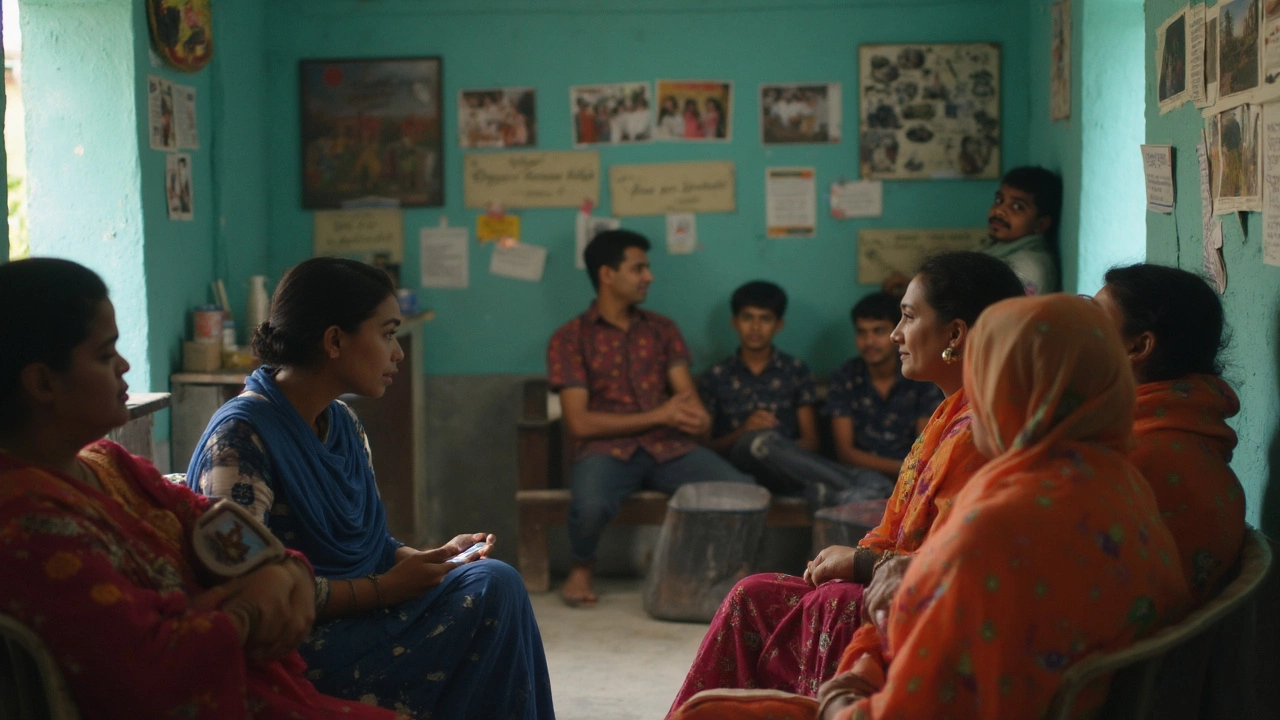Ever wondered if there’s a right time to quit volunteering? Most people jump in because they want to give back or meet new people. But sometimes, what started as a good thing starts feeling heavy. Maybe you catch yourself dreading your next shift, or your calendar feels jam-packed. If this rings any bells, you’re not the only one.
Studies from mental health researchers point out that volunteer burnout is real. It can sneak up just like job burnout—you start feeling exhausted, less motivated, or even resentful. That’s not just you being ungrateful; it’s your brain and body saying, ‘Hey, something’s gotta change!’
Before feeling guilty about stepping back, remember: your time and energy aren’t unlimited. Volunteering is a two-way street—it should be good for the organization and for you. If things shift and you’re just going through the motions or noticing more stress than satisfaction, it’s worth thinking about whether it’s time to take a break or move on entirely. The trick is learning to spot these signals early, so you can act before you reach breaking point.
- How Do You Know Volunteering Isn't Working Anymore?
- Big Life Changes: When Priorities Shift
- What You Owe and What You Don't
- Finding the Courage to Step Back
How Do You Know Volunteering Isn't Working Anymore?
Here’s the thing: volunteering is supposed to be rewarding, but there’s a point where it can start taking more from you than it gives. The real struggle? Figuring out exactly when that happens. If you catch yourself hitting some of these signals, it might be time to rethink your role.
- You start dreading your volunteer shifts. What used to be exciting now feels like a chore.
- Your energy is always low. After volunteering, you’re wiped out, not fulfilled.
- Your relationships, work, or personal life are taking a hit because you’re stretched too thin.
- You can’t remember the last time you enjoyed being a volunteer.
- The organization’s mission no longer lines up with your values or interests.
- Guilt is the only thing keeping you around—and that’s never sustainable.
This stuff is more common than you think. According to a 2023 survey by Volunteer Canada, over 35% of regular volunteers said they’ve felt overwhelmed or burnt out at some point. But they also found that folks who recognized and acted on these feelings early bounced back faster—some even found new volunteer opportunities that better suited their lives.
| Sign of Trouble | Percentage of Volunteers Affected (2023) |
|---|---|
| Feeling Overwhelmed | 35% |
| Losing Motivation | 21% |
| Conflicting Commitments | 19% |
| Lack of Recognition | 14% |
The most important thing is to check in with yourself. If your volunteer role is dragging you down more than it’s lifting you up, that’s a solid signal to pause and think about your next move. Don’t just push through for the sake of it. Knowing when to stop volunteering is just as important as knowing when to start.
Big Life Changes: When Priorities Shift
Life never stands still. Maybe you’ve started a new job, moved cities, had a baby, or you’re caring for a family member. All these changes pull your attention in new directions. It’s normal for volunteering to drop down your to-do list when your world changes. In fact, a 2023 report by VolunteerMatch found that nearly 40% of volunteers paused their service due to big life transitions—job changes, health issues, or family commitments ranked at the top.
Trying to balance volunteering with new responsibilities can quickly lead to burnout or missed commitments. If you’re always rushing to make it work, the quality of your help—and your own happiness—takes a hit. Being honest about your available time and energy prevents headaches for both you and the organization.
If your priorities have shifted, try this:
- Check your calendar for the next two months. Are you overbooked?
- Think about your current energy levels—are you drained after each shift?
- Ask yourself if volunteering is adding stress or joy to your week.
Sometimes, life only gives you so much room on your plate. It’s fine (and smart) to set boundaries, or even pause your volunteer work while you adjust. Here’s a simple table comparing what changes most often trigger people to stop volunteering:
| Big Life Change | % of People Reassessing Volunteering |
|---|---|
| New Job or Career Demands | 43% |
| Family Responsibilities | 37% |
| Personal Health Issues | 29% |
| Relocation | 19% |
If you see yourself in any of these categories, it might just be a signal to step back, regroup, and return when life calms down. There’s no shame in pausing. Guilt won’t add hours to your day—and the causes you care about aren’t going anywhere.

What You Owe and What You Don't
When it comes to volunteering, there’s a lot of talk about commitment, loyalty, and giving back. But here’s the deal: you’re not an employee. You have the right to set limits and say when enough is enough. So, what do you actually owe your volunteer organization, and what crosses the line?
Most organizations require you to show up when you’ve promised, follow basic policies, and give some notice if you decide to move on. But you don’t owe them unlimited overtime, your mental health, or loyalty at the expense of your own life. According to a 2023 Volunteer Canada report, around 55% of volunteers said they felt pressure to do more than they signed up for. But taking on too much benefits no one—not you, not the group you’re helping.
It helps to think in clear terms. Here’s what you really owe:
- Honor your agreed shifts or tasks while you’re involved.
- If you want to stop volunteering, give reasonable notice so others can plan.
- Be honest if your role no longer fits your needs, skills, or schedule.
- Treat people with respect—even when you’re stepping away.
And here’s what you don’t owe:
- Justifying your whole personal life or choices ("I’m busy" is enough of a reason).
- An open-ended commitment or unlimited flexibility on your part.
- Absorbing negativity or guilt trips from coordinators or other volunteers.
Check out this quick breakdown from a 2024 US volunteer survey about what made people step down from their roles:
| Reason for Leaving | Percentage |
|---|---|
| Scheduling conflicts | 37% |
| Burnout or stress | 24% |
| Lack of appreciation | 18% |
| Moved or life changes | 13% |
| Other | 8% |
So, before you worry about letting anyone down, remember: groups can adapt way easier than you might think, especially if you communicate honestly. Your well-being matters, and you have the right to walk away guilt-free when it stops working for you.
Finding the Courage to Step Back
Deciding to leave a volunteer role can make you feel guilty or nervous, especially if you’re used to helping out all the time. But here’s the thing: even the best volunteers reach a point where they need to hit pause or call it quits. According to a 2021 survey by VolunteerMatch, about 44% of volunteers have felt stretched too thin at least once, and almost a quarter have stopped volunteering for at least a year because of life changes or burnout.
If you relate, you’re not alone. Stepping back isn’t about letting others down—it’s about respecting your own limits. You’ll actually be a better help in the long run if you’re honest with yourself.
Here’s how to handle the process without burning bridges:
- Talk it out early. Don’t wait until you’re at your wits’ end to let the group know you need a break. Letting leaders know ahead of time helps them plan.
- Keep it real but kind. Be honest about your reasons (personal time, family, new jobs, or just needing a rest). No need for long explanations, but clarity helps.
- See if you can help train someone else or write down what you usually do. This can make your exit less stressful for everyone.
- If you want to leave the door open, suggest coming back for special events or lower-commitment tasks later on.
Plenty of people worry about backlash or gossip—especially in small towns or tight circles. But the truth is, most organizations expect turnover. Data from the U.S. Bureau of Labor Statistics shows the "average volunteer tenure" is under three years for most activities (see table below). Life happens. People move, get busy, and switch priorities—it’s normal.
| Volunteer Role | Average Tenure (Years) |
|---|---|
| Youth/Family Services | 2.4 |
| Environmental Projects | 2.8 |
| Health/Hospital Support | 2.2 |
| Animal Rescue | 2.6 |
Bottom line: saying no doesn’t make you selfish or lazy. Just like with any commitment, knowing when to stop volunteering is actually a sign of self-awareness and respect for everyone’s time—including yours.
